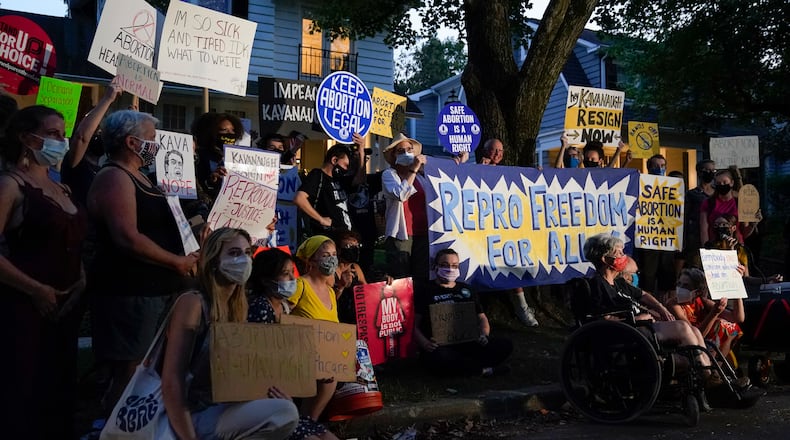Wait, you’ll say. Protestors have a right to free speech and freedom of assembly. That is true. But it’s also true that Title 18, Section 1507, of the U.S. Code, enacted in 1950, bars demonstrations “near a building or residence occupied or used by such judge, juror, witness, or court officer,” in involved in a judicial proceeding.
There are questions about whether this provision of the code would survive a court challenge because it’s never been tested as it relates to the justices. Legal experts interviewed by the Washington Post seem to believe it would be upheld, though that would make for a bit of a legal conundrum — if the case made its way to the Supreme Court, how does it rule on it since the case would directly involve some of its members?
There are also some practical considerations. What, for example, is “near” any such building or residence? Does a park 100 yards away count as “near?” What about across the street? Does expressing unhappiness under free speech protections rise to the level of coercion?
We don’t know the answers. But we do have a statute and we should uphold the law unless some court declares it unconstitutional. As such, the Department of Justice should put a halt to the demonstrations. After all, what’s the rationale for trying to uphold the law in one case but not another? Yes, January 6 and the demonstrations are two very different cases but they have one common thread — obeying the rule of law. We shouldn’t be able to pick and choose which ones we’ll obey and enforce.
The federal code comes from a well-meaning place. You don’t want people parading and picketing in an attempt to intimidate anyone involved in a judicial proceeding.
I can hear the objections, including the standard, “you can’t take away my right to” free speech or lawful assembly. Nobody would be. You can still grab a bullhorn and object or support the Roe decision, arrange a gathering at a public place, or protest in front of public buildings.
You can peacefully protest all you want. Just not in front of the homes of justices.
Remember, our rights are not absolute. We don’t get to do whatever we want whenever we want.
And while his next point is not a matter of law, it’s just as important. We need to have a little decency. You can express your outrage in ways that don’t infringe on your rights or the rights of others.
I was distressed when people protested in front of the home of Dr. Amy Acton when, as head of the Ohio Department of Health, she enacted COVI?D rules not everyone agreed with. The “protests” included sickening anti-Semitic slurs.
But guess what? Ohio has no law that prohibits demonstrations in front of the homes of public officials, so the protestors were within their rights. Since I support the law, I support their rights to protest, even though I found some of the group’s behavior reprehensible.
Why, you might ask, don’t the states in which the justices live, in Maryland and Virginia, stop the demonstrations? Because the laws in both states that prohibit some demonstrations in front of private homes have similarities to another law that’s already been ruled unconstitutional. Officials in both states have rightfully looked to the DOJ.
We should believe in and abide by the laws on the books and not just the ones that we want to see enforced. Just as we should uphold the law, to the fullest extent, on the Capitol riots, we should do the same when it comes to protecting Supreme Court justices, no matter what you think of them or their rulings.
Ray Marcano’s column appears on these pages each Sunday. You can send him a question or comment at raymarcanoddn@gmail.com.
About the Author

